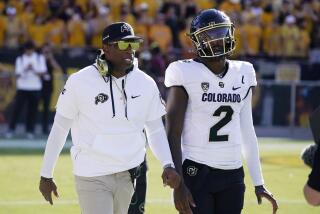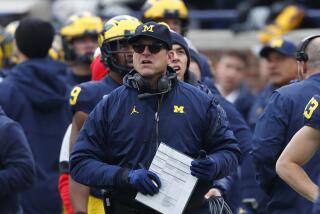NCAA’s Decision on SMU Will Be Revealed Today
- Share via
When David Berst, the director of enforcement for the National Collegiate Athletic Assn., left Kansas City Tuesday afternoon for Dallas, he carried with him the fate of Southern Methodist University’s football program.
The seven-page typewritten document secured in Berst’s briefcase contained the NCAA’s penalties against SMU, details of which neither the NCAA nor the school was willing to discuss Tuesday.
Earlier reports indicated that the Mustangs will not have to face the so-called “death penalty,” a two-year suspension of their football program. But exactly what conclusion the NCAA reached was kept secret Tuesday.
Darlene Irwin, speaking for SMU, said that the NCAA’s decision would be made public at 8:15 (CST) this morning at the Umphrey Lee Student Center on the SMU campus.
“At that time, they will hand out the official NCAA report,” Irwin said. “And then at 9 a.m., they will be holding a press conference. At that press conference will be our president (interim president William Stallworth) and our faculty athletic representative Lonnie Kliever and David Berst from the NCAA.”
Irwin said she does not expect SMU, currently in the second year of three years’ probation, to contest the NCAA’s findings.
“I think (SMU officials) have already said that whatever the (NCAA infractions) committee decides, we will not argue with it,” she said. “Whatever report is made will be what will happen.”
Kliever and Stallworth met with Berst in Dallas Tuesday night and were given copies of the NCAA report. There was no immediate response from either official, although Kliever last week had been quoted as saying that he did not expect the NCAA to level the most severe penalty possible.
Under legislation adopted in June, 1985, the NCAA can suspend a repeat offender such as SMU for up to two years, prohibiting competition, recruiting, coaching or the granting of scholarships during that period. SMU was one of six schools that voted against the legislation.
The new rule also says that the “death penalty” does not necessarily have to be imposed if there are “unique” circumstances.
SMU officials maintain that their immediate, thorough investigation with the help of the NCAA makes the school’s case unique.
In addition, at a meeting with the six-member infractions committee in San Diego recently, SMU volunteered to impose its own “severe penalties.” These proposed penalties included dropping nonconference games, scholarships and television and bowl appearances.
SMU has nonconference games scheduled with Oklahoma and New Mexico next season and with Oklahoma and Notre Dame in the 1988 season. Two other games have yet to be scheduled.
Today’s announcement will mark the fifth time that the Mustangs have been penalized by the NCAA in the last 12 years. The football program had been put on probation in 1981 and again in 1985.
Because of its current probationary status, the school had no scholarships to give last year and was barred from television and bowl games. SMU had 15 scholarships to grant Feb. 11 on national signing day but did not offer them. There are only 52 scholarship football players left on campus.
Since the latest scandal broke, most of the leading figures in the drama have left. President L. Donald Shields retired, and Athletic Director Bob Hitch and football Coach Bobby Collins both resigned. None of the three have been replaced.
If the NCAA allows SMU to retain its football program, as Kliever believes will happen, the penalties imposed are expected to include loss of some or all nonconference games for the next three years, additional loss of scholarships and a ban on bowl games through 1990 at least.
According to United Press International, today’s NCAA report will not contain the names of those involved in the infractions. SMU officials have said that names of those violating NCAA regulations will be kept secret because they could not have gathered the information they did without promising anonymity.
There were also indications that the names of those involved have been stricken from all records in the case so that they cannot become public even if the documents are opened in the future.
A number of Texas newspapers have sued to have such documents come under the Texas Open Records Act, and the newspapers won the most recent decision in the 5th Circuit Court of Appeals in New Orleans.
Meanwhile, on the SMU campus Tuesday, the mood reportedly appeared to be one of resignation to the inevitable.
“I think everybody is just sort of anxious to get it over with,” Irwin said. “To find out what’s going to happen and get on with our lives.”
More to Read
Go beyond the scoreboard
Get the latest on L.A.'s teams in the daily Sports Report newsletter.
You may occasionally receive promotional content from the Los Angeles Times.










